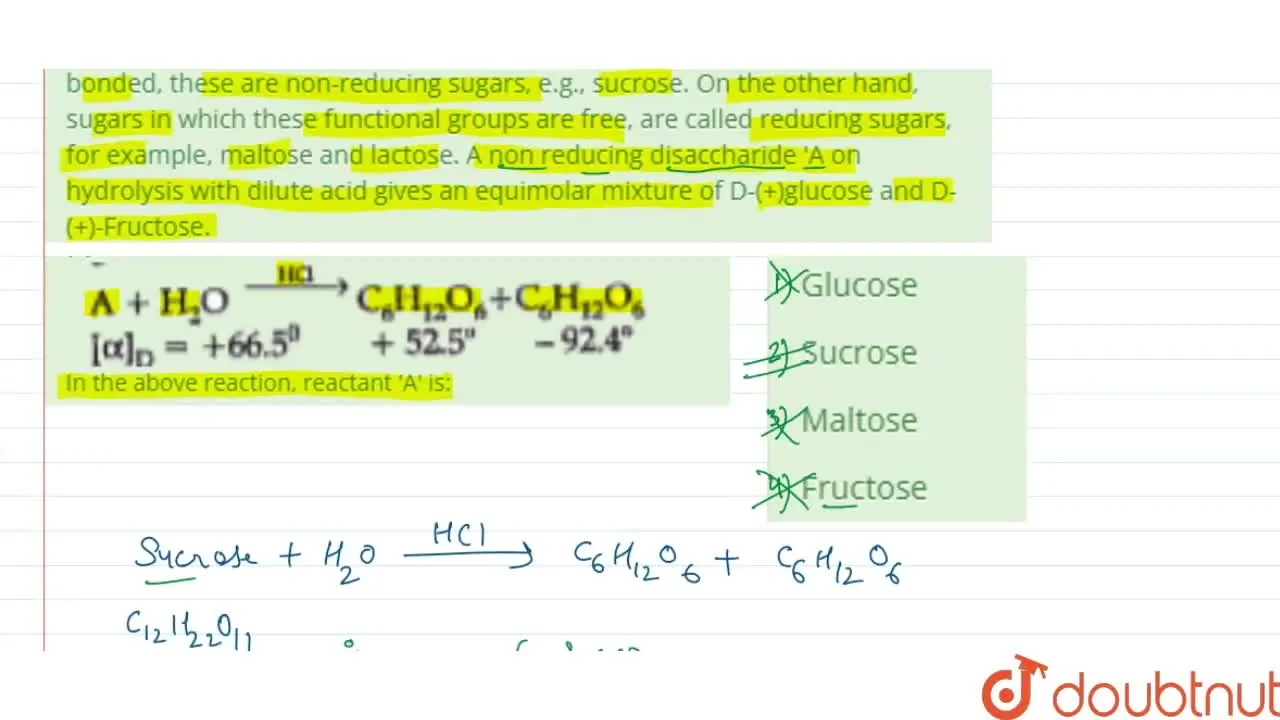The two monosaccharides are joined together by an oxide linkage formed by the loss of a water molecule. Such a linkage between two monosaccharide units through oxygen atom is called glycosidic linkage. In disaccharides, if the reducing groups of monosaccharides i.e., aldehydic or ketonic groups are bonded, these are non-reducing sugars, e.g., sucrose. On the other hand, sugars in which these functional groups are free, are called reducing sugars, for example, maltose and lactose. A non reducing disaccharide 'A on hydrolysis with dilute acid gives an equimolar mixture of D-(+)glucose and D-(+)-Fructose.

In the above reaction, reactant 'A' is:
Glucose
Sucrose
Maltose
Fructose
The correct Answer is:B
C12H22O11(A)(sucrose)+H2OH+−−→C6H12O6glucose+C6H12O6fructose
Similar Questions
The two monosaccharides are joined together by an oxide linkage formed by the loss of a water molecule. Such a linkage between two monosaccharide units through oxygen atom is called glycosidic linkage. In disaccharides, if the reducing groups of monosaccharides i.e., aldehydic or ketonic groups are bonded, these are non-reducing sugars, e.g., sucrose. On the other hand, sugars in which these functional groups are free, are called reducing sugars, for example, maltose and lactose. A non reducing disaccharide 'A on hydrolysis with dilute acid gives an equimolar mixture of D-(+)glucose and D-(+)-Fructose.

Name the linkage that holds the two units in the disaccharide?View SolutionThe two monosaccharides are joined together by an oxide linkage formed by the loss of a water molecule. Such a linkage between two monosaccharide units through oxygen atom is called glycosidic linkage. In disaccharides, if the reducing groups of monosaccharides i.e., aldehydic or ketonic groups are bonded, these are non-reducing sugars, e.g., sucrose. On the other hand, sugars in which these functional groups are free, are called reducing sugars, for example, maltose and lactose. A non reducing disaccharide 'A on hydrolysis with dilute acid gives an equimolar mixture of D-(+)glucose and D-(+)-Fructose.

What is the mixture of D-(+) glucose and D-(+) fructose known as ?View SolutionThe two monosaccharides are joined together by an oxide linkage formed by the loss of a water molecule. Such a linkage between two monosaccharide units through oxygen atom is called glycosidic linkage. In disaccharides, if the reducing groups of monosaccharides i.e., aldehydic or ketonic groups are bonded, these are non-reducing sugars, e.g., sucrose. On the other hand, sugars in which these functional groups are free, are called reducing sugars, for example, maltose and lactose. A non reducing disaccharide 'A on hydrolysis with dilute acid gives an equimolar mixture of D-(+)glucose and D-(+)-Fructose.

Glucose on reaction with acetic acid gives glucose pentaacetate. What does it suggest about the structure of glucose ?View SolutionIn disaccharides, if the reducing groups of monosaccharides, i.e., aldehydic or ketonic groups are bonded, these are non-reducing sugars. Which of the following disaccharide is a non-reducing sugar?
View SolutionIn disaccharides, if the reducing groups of monosaccharides, i.e., aldehydic or ketonic groups are bonded, these are non-reducing sugars. Which of the following disaccharide is a non-reducing sugar?
View SolutionIn disaccharides, if reducing groups of monosaccharides i.e. aldehydic or ketonic groups are bonded, these are non-reducing sugars. Which of the following disaccharides is a non-reducing sugar ?
View SolutionWhich is non-reducing sugar
View SolutionName the linkage which joins two monosaccharide units through oxygen atoms.
View SolutionThe linkage between the two monosaccharide units in lactose is
View SolutionThe linkage between the two monosaccharide units in lactose is _____.
View Solution


